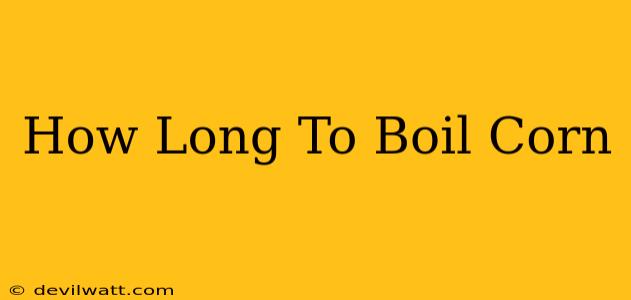Boiling corn on the cob is a simple yet satisfying way to enjoy this summer favorite. But how long should you boil it for to achieve that perfect balance of tender kernels and sweet flavor? The answer isn't always straightforward, as it depends on a few factors. This guide will walk you through the process, ensuring you get deliciously cooked corn every time.
Factors Affecting Corn Boiling Time
Several things influence how long you need to boil corn:
- Corn Freshness: Freshly picked corn will cook faster than corn that's been sitting around for a few days. The fresher, the better!
- Corn Size: Larger ears of corn will naturally require a longer boiling time than smaller ones.
- Desired Texture: Do you prefer your corn slightly crunchy or extremely tender? Adjust your boiling time accordingly.
How Long to Boil Corn on the Cob: A Step-by-Step Guide
Here's a general guideline for boiling corn on the cob:
1. Preparation:
- Shuck the Corn: Remove the husks and silks from your corn. You can leave the corn silk on for added flavor, but many prefer removing it for easier eating.
- Fill the Pot: Fill a large pot with enough water to completely submerge the corn. Add a generous pinch of salt to enhance the flavor. Some people also add a tablespoon of sugar or butter to the water.
2. Boiling Time:
- For Fresh, Medium-Sized Ears: Boil the corn for 5-7 minutes for slightly firm kernels. For extremely tender corn, boil for 8-10 minutes.
- For Older or Larger Ears: You might need to boil for an additional 2-3 minutes to ensure the corn is cooked through.
- Test for Doneness: After the minimum boiling time, test the corn by piercing a kernel with a fork or knife. It should be tender but not mushy.
3. Cooling and Serving:
- Drain and Cool: Once cooked, remove the corn from the pot and drain well. Let it cool slightly before serving.
- Serving Suggestions: Enjoy your perfectly boiled corn with butter, salt, pepper, or your favorite seasonings.
Tips for Perfectly Boiled Corn
- Don't Overcook: Overcooked corn will be mushy and lose its sweetness. It's better to slightly undercook it than overcook it.
- High Heat Boiling: Bring the water to a rolling boil before adding the corn. This ensures even cooking.
- Don't overcrowd the pot: Make sure there's enough space for the corn to cook evenly. If you have a lot of corn, consider cooking it in batches.
- Consider Steaming: Steaming is another excellent way to cook corn on the cob. It can often result in a sweeter and more flavorful product.
Troubleshooting Common Corn-Boiling Problems
- Corn is too hard: You probably didn't boil it long enough. Try adding a few more minutes of boiling time.
- Corn is too soft: You likely overcooked the corn. Reduce the boiling time next time.
By following these simple steps and tips, you can achieve perfectly boiled corn every time. Enjoy!

